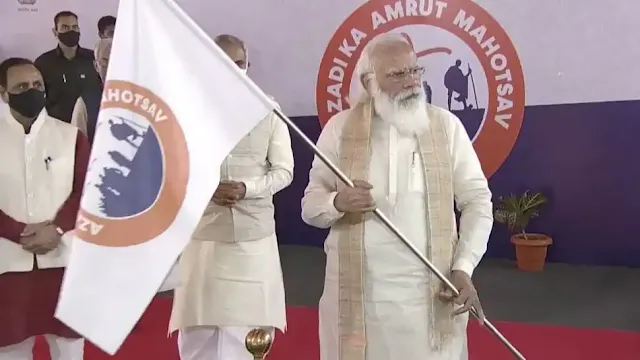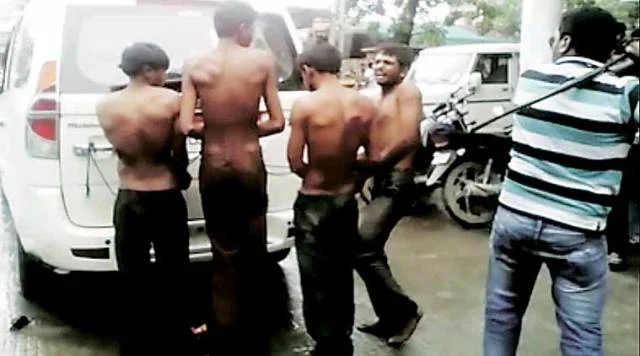 |
| Prime Minister flagging off 75 week celebrations on March 12 |
I am indeed very thrilled! India is fast moving towards becoming Vishwa-Guru! Our Prime Minister gave us this wonderful news while launching a 75 day, sorry 75 week, celebration of completing 75 years of our freedom on the March 12, 2021. The celebration will be organized at 75 places covering the entire country. He stated that India is fast moving towards becoming Vishwa-Guru, a teacher of the entire world, a leading light and a mentor of the world, and will soon shine as the Harbinger of Enlightenment in the world!
Of course, we would need to ignore comments from the “outsiders” who are stating that India is a partial democracy, or an electoral autocracy, and so on and so forth. Apparently, they are stating all this only out of utter jealously. To add to our happiness, the Chief Minister of Gujarat has also announced that Gujarat has moved far ahead on its way to becoming a Vishwa-Guru. Wow! Excellent! I am really enthralled. We on the top of the world with this news!
Of course, initially I was slightly puzzled, but now no more. I would wonder: How would India move ahead on this path with a mere 77.37% (NSSO 2018) literacy rate when the average literacy in the world is 86%! I also remembered that the Government of India has reduced its budget on education by Rs 6,000 crore amidst severe decline to schooling this year. Gujarat is also planning to spend a mere 1.7% Gujarat’s total income on education, when the norm is 6% of the State Domestic Product (SDP)!
But soon I realised that India, which is on way to becoming Vihswa-Guru, can teach a lot many other things, other than knowledge, to the world. Indeed we are capable of teaching many, many important things to the world!
The first thing India can teach the world is how to find occasions to celebrate, and how to celebrate on a large scale. For example, the PM has announced a grand celebration of 75 weeks (525 days!) at 75 places in the country on the occasion of 75 years of our Independence! The celebration began from Ahmedabad on March 12 with what was claimed to be a replica of Dandi March.
The first thing India can teach the world is how to find occasions to celebrate, and how to celebrate on a large scale. For example, the PM has announced a grand celebration of 75 weeks (525 days!) at 75 places in the country on the occasion of 75 years of our Independence! The celebration began from Ahmedabad on March 12 with what was claimed to be a replica of Dandi March.
Of course, claiming to “follow” Gandhiji, Modiji did not want to see the poor localities/slums on his way to Sabarmati Ashram to the airport and back, one reason why these localities were hidden behind especially fixed curtains. The slum people were asked not to show up when the PM’s long caravan passed by on the main road. Money does not matter for such occasions, as what is money compared to this grand celebration?
There have been other innumerable occasions for the government to celebrate – like during visits by world leaders to India. When former US President Donald Trump came to India in February 2020, the Government organized dances and songs on his way from airport on both the sides of the road – though it is a different matter that the bullet proof car was closed and it moved on the road rather fast! The Government spent crores to collect VIP crowd of more than one lakh from all over the country to the inauguration of the Motera Stadium. The stadium is now re-inaugurated and is has been called Narendra Modi Stadium – again amidst in a huge festival!
Earlier, the Government celebrated super well the visit of the Chinese President at the Sabarmati Riverfront by constructing awfully expensive special purpose domes. The Chinese leader sat on an especially installed well-decorated swing and was also shown on the screen tasting some special Gujarati delicacies.
There have been other innumerable occasions for the government to celebrate – like during visits by world leaders to India. When former US President Donald Trump came to India in February 2020, the Government organized dances and songs on his way from airport on both the sides of the road – though it is a different matter that the bullet proof car was closed and it moved on the road rather fast! The Government spent crores to collect VIP crowd of more than one lakh from all over the country to the inauguration of the Motera Stadium. The stadium is now re-inaugurated and is has been called Narendra Modi Stadium – again amidst in a huge festival!
 |
| The Una incident |
Shouldn’t we also teach the world the art and craft of mob-lynching? The world has almost forgotten this craft
Such celebrations take place in all parts of the country – for Bhumi Pujans at the foundation stone laying ceremony for roads and bridges, buildings and hospitals, and, of course, temples (remember Ram Mandir at Ayodhya?), fairs and exhibitions, new scheme and new plans. So what if some of the ceremonies are held even after the construction work is over and the projects are operating already in full swing?
A mid-night celebration was organized even when a new tax was launched, the Goods and Services Tax (GST). What if what many termed it as half-baked tax measure, leading to serious problems to the economy? We have also acquired expertise in organizing huge fairs for the welfare of the poor – they are called Gharib Kalyan Melas! We can definitely teach the world how a poor country like ours has the ability and acumen to take up such expensive fairs for the underprivileged. These expensive festivals may result in reduction in development expenditure. So what?
Another thing that we can teach the world how to carry out propaganda. Photographs of our PM and CMs appear all over – in newspapers, magazines, bus stops, public buses, petrol pumps, exhibitions, vaccination certificates, food packets given to disaster affected people. All this is widely publicised both in government publications and non-publications!
A mid-night celebration was organized even when a new tax was launched, the Goods and Services Tax (GST). What if what many termed it as half-baked tax measure, leading to serious problems to the economy? We have also acquired expertise in organizing huge fairs for the welfare of the poor – they are called Gharib Kalyan Melas! We can definitely teach the world how a poor country like ours has the ability and acumen to take up such expensive fairs for the underprivileged. These expensive festivals may result in reduction in development expenditure. So what?
Another thing that we can teach the world how to carry out propaganda. Photographs of our PM and CMs appear all over – in newspapers, magazines, bus stops, public buses, petrol pumps, exhibitions, vaccination certificates, food packets given to disaster affected people. All this is widely publicised both in government publications and non-publications!
People from other countries don’t seem to know what joy people get on seeing these photographs – even at most at unexpected places (I don’t want to name these spots... it’s public knowledge). We can teach the world this highly imaginative strategy of making people happy. It is indeed sad that this happiness is not counted in the World Happiness Index!
Finally, shouldn’t we also teach the world the art and craft of mob-lynching? The world has almost forgotten this craft ever since the fall of many cruel dictators. We can revive this, as we have done it on more than 150 mob-lynching incidents over the last five years. Doesn’t lynching require courage, collective strength and boldness, or, as some would say, a 56 inch chest? The reasons for lynching could be anything. One of the best known is protecting our mother Holy Cow.
The enthusiasts are allowed to take video and circulate them around as a sign of their support – as it happened in Gujarat’s Una. When this happens, the cops should look the other way. Top all to this, we have seen how political leaders love being happily garlanded by those accused of lynching. Who cares when many of our “mothers” freely walk loiter around on roads unprotected and uncared, eating plastics along with leftovers? How many mothers you can protect, after all?
Indeed, we are moving towards becoming a Vishwa-Guru in a new, innovative way. Surely, those at the helm of affairs would be very happy to showcase to the world how to spread awareness on some of these special talents. We have a huge potential to be a Vishwa-Guru, perhaps the only leading light of the world!
---
*Director and Professor of Economics, Center For Development Alternatives, Ahmedabad
Finally, shouldn’t we also teach the world the art and craft of mob-lynching? The world has almost forgotten this craft ever since the fall of many cruel dictators. We can revive this, as we have done it on more than 150 mob-lynching incidents over the last five years. Doesn’t lynching require courage, collective strength and boldness, or, as some would say, a 56 inch chest? The reasons for lynching could be anything. One of the best known is protecting our mother Holy Cow.
The enthusiasts are allowed to take video and circulate them around as a sign of their support – as it happened in Gujarat’s Una. When this happens, the cops should look the other way. Top all to this, we have seen how political leaders love being happily garlanded by those accused of lynching. Who cares when many of our “mothers” freely walk loiter around on roads unprotected and uncared, eating plastics along with leftovers? How many mothers you can protect, after all?
Indeed, we are moving towards becoming a Vishwa-Guru in a new, innovative way. Surely, those at the helm of affairs would be very happy to showcase to the world how to spread awareness on some of these special talents. We have a huge potential to be a Vishwa-Guru, perhaps the only leading light of the world!
---
*Director and Professor of Economics, Center For Development Alternatives, Ahmedabad

Comments